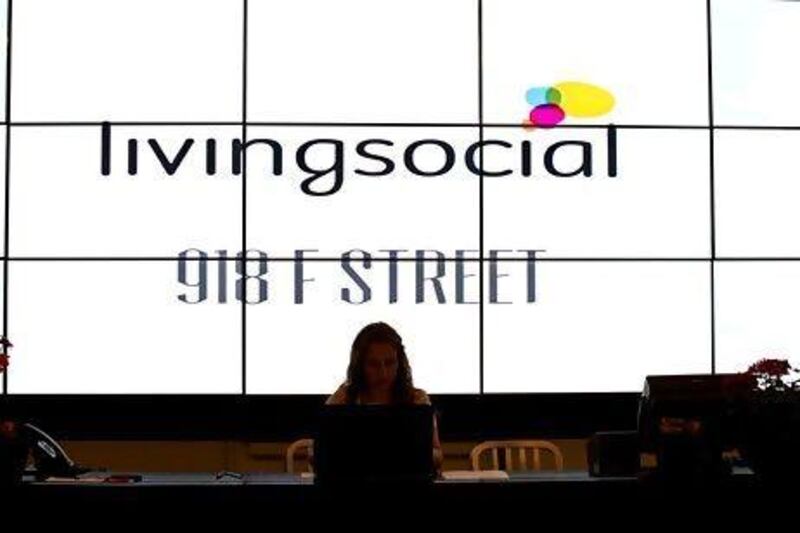LivingSocial is trying to offload its Middle East business for US$3 million (Dh11m), or less, and has set a deadline to find a buyer this week.
The daily-deals giant, based in the United States, has held talks with several potential buyers after failing to turn a profit in the region's cut-throat daily-deals business.
Documents seen by The National show LivingSocial has incurred significant losses in the region. In one month this year it lost more than $500,000.
It was revealed this week LivingSocial was looking to sell its subscriber bases in the UAE, Egypt and Lebanon.
LivingSocial has set an asking price of $3m but is open to offers as low as $1m, according to sources with knowledge of the negotiations who wished to remain anonymous.
More than 20 daily-deals sites have launched in the Middle East, crowding the market. Commentators said the business model and technology used by the discounts sites was easy to copy. "Anyone can do it," said Imad Kublawi, the chief executive of IK Consult and a regional partner of Results International, which specialises in mergers and acquisitions in the communications and technology industries.
Mr Kublawi said it was "not a surprise" LivingSocial was looking to pull out of the Middle East, just a year after entering the market through the acquisition of the regional deals site GoNabit.
"They only entered the market last year. It was a very expensive way to find out it's not working," he said. "It's become a very generic offering.
"Anyone can download a formula and start a group-purchasing website."
Mr Kublawi said LivingSocial's biggest asset in the Middle East was probably its database of customers, thought to number about 750,000 email addresses.
But even that would only be worth about $370,000, he said. "For a clean database, you're probably assuming $500 per 1,000."
Tarek Sultani, a director in the Middle East for Landor Associates, a brand consultancy, said companies faced "risks" in offering deals through group-buying sites.
"Brands must be careful in how they use these deals to meet sales targets and fill up excess capacity," he said. "I recommend that organisations look at the impact from a long-term perspective."
The rival site Cobone, which claims to be the biggest operator in the market by sales, acknowledged there were "challenges" with the group-buying model.
But Paul Kenny, the chief executive of Cobone, said the fundamentals of the business model were sound and the site was evolving with the launch of shopping and travel sections. "While we will try and diversify and become much more than what we are, the daily-deals concept is still a very good one," he said.
"A lot of people are getting in quite a flap about the business model but there's a lot of good that is coming from it. We're pushing out up to 1,500 deals a month."
Another rival site, Groupon, the global leader in the daily deals sector, launched in the UAE early last year. The company received a deluge of complaints of poor customer service this year and changed its Middle East chief executive twice in a number of months. Groupon has since taken steps to improve its customer service.
Alexander Kappes, the chief executive of Groupon Middle East, said this week the company was making a profit in the region, despite weak global results that had wiped hundreds of millions of dollars from the market value of its parent.
LivingSocial declined to comment on the potential sale of its Middle East operations.
rjones@thenational.ae





